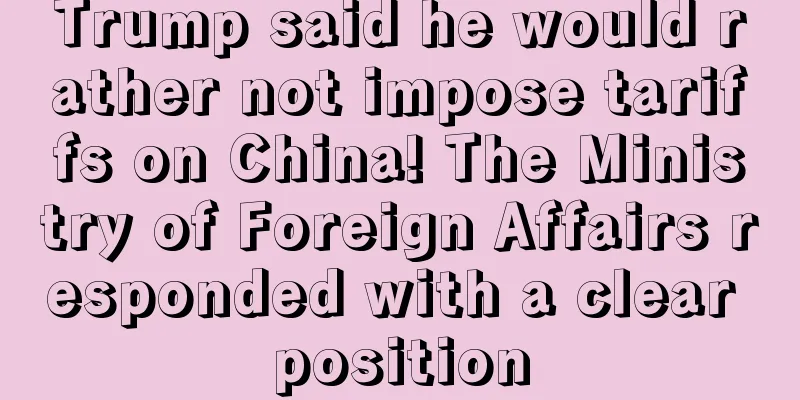Trump said he would rather not impose tariffs on China! The Ministry of Foreign Affairs responded with a clear position

|
It is learned that on January 24, according to foreign media reports, US President Trump said in an interview that tariffs are a "huge force" for the United States against China, but he also said that he would rather avoid using this means. It is reported that Trump emphasized in the interview that the United States can use tariffs to put pressure on China, and mentioned that tariffs are a "powerful power" of the United States. He also expressed confidence in reaching an agreement with China on fair trade, but did not disclose specific measures. In addition, he reiterated his previous tariff threat, saying that a 10% tariff may be imposed on Chinese exports from February 1 to deal with China's shortcomings in controlling fentanyl. Analysts believe that Trump did not immediately impose tariffs on China in the early days of his presidency, which was interpreted by the market as a positive sign. However, during his campaign, he proposed to impose additional tariffs of up to 60% on China. If implemented, this policy will have a serious impact on Sino-US bilateral trade and China's export-dependent economy. Although the recent tariff threat is milder than before, it still adds uncertainty to the economic and trade relations between the two countries. In response to the US tariff-related remarks, Chinese Foreign Ministry spokesperson Mao Ning responded at a press conference on January 22 that China has repeatedly stated its position, emphasizing that there are no winners in trade wars and tariff wars, and reiterated that China will firmly safeguard its national interests. The next day, Chinese Ministry of Commerce spokesperson He Yadong further pointed out that tariff measures are not beneficial to both China and the United States or the global economy. China advocates promoting the stable development of Sino-US economic and trade relations based on the principles of mutual respect, peaceful coexistence, and win-win cooperation. Trump frequently uses tariffs as the main tool in negotiations with China, which appears to be a tough stance, but in reality is more to cater to domestic voters and gain short-term benefits. In the future, whether the US will formally implement tariff measures and China's further response will have an important impact on the direction of the situation. Author ✎ Rayna/ Statement: This article is copyrighted and may not be reproduced without permission. If you need authorization, please contact: happy |
<<: Korean beauty products are sweeping the US market, accounting for 85% of Amazon sales in the US
>>: China strikes back! Imposing tariffs on some US imports
Recommend
What is Midianyun (Beijing) Technology Co., Ltd.? Midianyun (Beijing) Technology Co., Ltd. Review
Midianyun (Beijing) Technology Co., Ltd. accuratel...
What is an Amazon Removal Order? Amazon Removal Order Review
Removal order is Amazon's request to sellers t...
What is Jiji? Jiji Review
Jiji is one of the most popular online platforms i...
What is FORZIERI? FORZIERI Review
FORZIERI is an Italian one-stop luxury accessories...
The most popular e-commerce platforms in Mexico in 2021: Amazon and Walmart are at the top!
It is learned that according to Statista's sur...
What is Skrill? Skrill Review
Skrill, formerly known as moneybookers, is a Briti...
Home Depot's Q3 revenue is $43.2 billion, and it raises its full-year earnings forecast
It is learned that recently, the US home furnishin...
The latest Amazon news for sellers
The Amazon market is unpredictable and unpredictab...
What is Vine Vioces? Vine Vioces Review
In October 2016, Amazon released new rules for rev...
There is a risk of falling! This baby stroller on Amazon is urgently recalled!
<span data-shimo-docs="[[20,"获悉,据外媒报道,2月16...
Save more than half?! Amazon's new preferential rates are coming soon!
The biggest benefit Amazon sellers have received i...
Many Shenzhen freight forwarders went bankrupt! The list of detained containers is released!
It is the peak season for foreign trade and a time...
What is Amazon manual advertising? Amazon manual advertising review
Amazon manual advertising is a form of advertising...
Starting from scratch, Shopify's 30-day store tutorial - Day 19
In yesterday’s tutorial, we revealed two main rea...
What is Tingke Cross-border? Tingke Cross-border Review
Tinkleo is a cross-border e-commerce platform crea...









